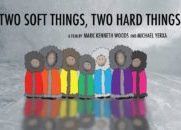
What starts out as such a disturbing eyeopener with some of more shocking aspects of the history of the Inuit people in Nunavut, the Northern Territory of Quebec in Canada, does thankfully end on a positive and upbeat note for the people who identify as LGBT in that community. This new wonderful documentary from filmmakers Mark Kenneth Woods and Michael Yerxa begins with the bleak facts of how the effects of enforced colonization of these indigenous First Nation natives, combined with the doctrine of Catholic missionaries, was so treacherous for its very survival. From the mid part of the last century they imposed their own western standards on a civilization that had survived for a few thousand years, which was not only troubling to say the least, but it challenged its very culture and society.
When the Canadian Federal Government forced most Inuit families to leave their traditional Nunavik area in the 1950s to inhabit this newly established Territory, they eventually helped the local population form their own Legislature which for the most part would be governed by existing Canadian laws. However in 2003 it was required to adopt a Human Rights Charter which would bring it in line with the rest of the country, but as this Bill included LGBT rights it almost failed to pass.
What strikes one most from all the interviews included from older Inuits was the fact that until Christianity took a stranglehold on the nation, they had always been a traditional culture that was all-embracing and non-judgmental and that would include polymory marriages. Fortunately in this instance, there was one brave legislator Jack Anawak who made such an impassioned plea to ensure that the Bill passed.
It was much overdue as by then the suicide rate for Inuit troubled teens, LGBT and otherwise had rocketed to be the highest in the whole of Canada, and the new law would at least be one tiny step towards seeing that start to decline.
It was about the same time the very first Gay Pride event was held in the Territory. A picnic for the tiny LGBT community and allies that started with barely a dozen people when it started, and by the time it stopped a few years later, had dramatically increased and included the Inuit Elders too. It was revived in 2014 and for the first time sought to include LGBT people and allies of all ages, and was measured a major success. What was interesting however is the whole culture of ‘pride’ itself is alien to the Inuit culture who traditionally are a more discreet society that doesn’t really embrace any kind of pride, so going forward they feel they will need to adapt a language/attitude for these celebrations which is more in keeping with their culture.
In the final part of this completely engrossing film the mood was still a tad cautious, but was filled with such optimism for the future as high school students related how easy their ‘coming out’ had been, and the mother of a trans son told of how enlightening her experience had been supporting her son in a new more accepting society. Nuka Fennell who had escaped to Ottawa a few years ago simply for his own survival, now talks about going home with his husband, as he feels that the time is now right.
The Inuits are a tough and resilient people used to the harsh conditions of the Arctic, and the over-whelming message of this unmissable movie is that left to their own devices the history of their remarkable culture indicates they will eventually fully embrace the LGBT members of their community.
The final words however must be from Jesse Mike one of the most articulate interviewees featured who grinned from ear to ear when said that she had researched the acceptance of homosexuality in the past in their culture. The word that was used for lesbian literally translated into ‘two soft things rubbing against each other’ with the word for gay men being the ‘two hard things.’

